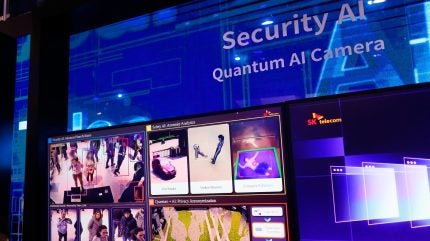
The dangers quantum technology poses to encryption networks has made it a point of increasing geopolitical sensitivity – forcing the US, China and other major world players to develop national quantum strategies.
The Pentagon, Chinese People’s Liberation Army (PLA) and Nato are among the leading military bodies investing heavily in quantum technology, according to GlobalData’s Quantum Computing in Aerospace, Defense and Security – Thematic Intelligence report.

Discover B2B Marketing That Performs
Combine business intelligence and editorial excellence to reach engaged professionals across 36 leading media platforms.
There are three main strands used in defence: quantum computers (to process large amounts of data faster and more accurately than traditional computers), quantum sensing (detecting enemy submarines or mines) and quantum communication (secure channels for communication protected from eavesdropping).
Pentagon at the pinnacle?
Close ties to Microsoft, IBM, Intel and other tech giants give the US a key advantage in developing quantum technology for military applications.
In 2022, President Biden signed the CHIPS and Science Act, which “authorises new investments in core quantum research programs” while the US military also announced $3bn of federal quantum projects, with an additional $1.2bn coming from the National Quantum Initiative.
The Pentagon’s so-called black budget projects are expected to further fund quantum computing initiatives.

US Tariffs are shifting - will you react or anticipate?
Don’t let policy changes catch you off guard. Stay proactive with real-time data and expert analysis.
By GlobalDataWhile the US may struggle to compete with China’s focused research in quantum communication through its centralised, state-led approach, the sheer range of hardware research increases the likelihood of major quantum breakthroughs happening in Washington first.
Beijing aims to keep pace
The US CHIPS and Science Act is open in its intentions to “counter China” – which will be no mean feat.
China is committing more than $15bn to quantum computing over the next five years and is drawing expertise from across the country through its $10bn National Quantum Lab at USTC Hefei.
Over the long term, China’s autocratic economic model will be an advantage over the US; less bureaucracy and pushback against quantum investments.
While Beijing maintains a cloud of secrecy around the nature of its quantum investments, “intermittent announcements demonstrate its strong position in quantum computing”, the report adds.
For example, the PLA is the world leader in quantum communication through the Micius satellite project and the Beijing–Shanghai Quantum Secure Communication Backbone. But quantum supremacy claims from some of the world’s fastest photon-based and supercomputing quantum computers show its true potential.
Who are the other players in quantum technology?
While far behind the US and China, the EU’s Quantum Technologies Flagship program will provide $1.2bn of funding over the next ten years.
Individual member states are rolling out various R&D initiatives, with France and Germany, Europe’s largest economies, having the most comprehensive national strategies.
Germany announced $3bn to develop quantum technologies in May 2023, and although start-ups in the Netherlands, Finland, Spain and Austria have made notable contributions, this number remains unsurpassed.
In February 2021, Nato Defence Ministers endorsed the Emerging and Disruptive Technologies (EDT) Strategy within which quantum-enabled technology was one of the nine technology areas promoted.
Nato’s Defence Innovation Accelerator for the North Atlantic (DIANA) has been a particular driver of quantum investment.
DIANA’s conceptualisations of quantum underwater warfare, inertial navigation and chemical detections have been widely used as benchmarks for the technology’s military applications.
The EU and Nato’s investments will be driven in part by Russia – a newer quantum computing player.
Alongside India, Moscow established a quantum agenda in 2020. Both governments committed $1b, with Russia’s National Quantum Laboratory, led by its state atomic energy company, Rosatom, pledging to specialise in applying quantum technologies in the nuclear industry.
However, the report concludes that both countries’ smaller talent pools and loosely built ecosystems mean it will be several years before they are competitive with the US, China, and other more established quantum players.





